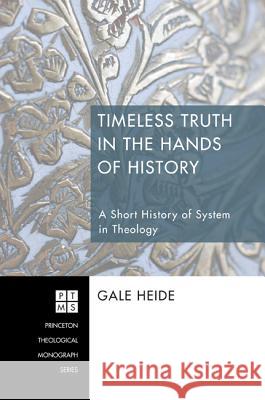Timeless Truth in the Hands of History: A Short History of System in Theology » książka
Timeless Truth in the Hands of History: A Short History of System in Theology
ISBN-13: 9781556354977 / Angielski / Miękka / 2012 / 232 str.
Timeless Truth in the Hands of History: A Short History of System in Theology
ISBN-13: 9781556354977 / Angielski / Miękka / 2012 / 232 str.
(netto: 126,38 VAT: 5%)
Najniższa cena z 30 dni: 132,70
ok. 16-18 dni roboczych
Bez gwarancji dostawy przed świętami
Darmowa dostawa!
Description: ""What is the purpose of theology for the church?"" Systematic theology provides an inroad into this question by offering both a method for doing theology and an explanation for the purpose of that method. However, ""system"" is itself the product of a specific understanding of knowledge grounded in rational demonstration of facts. This study attempts to address the historical debate over when systematic theology began. Much of the debate is centered on the definition of system and revolves around the use, or lack thereof, of external philosophical categories or language. Specific historical figures have been selected to serve as illustrations of how theological prolegomena functioned in works prior to and following the influence of Enlightenment thought. In the early chapters it will be seen that theology was neither totally saturated with, nor totally devoid of, external philosophical reference points or programmatic intentions. On the contrary, both external points of reference and programmatic intentions have played a role in theology since the church's inception. In other words, certain elements of system (e.g., logic, non-contradiction, organization) have played a role in theological investigation and construction since, at least, the second century. The last two chapters of this study demonstrate that these may not be the same influences that have marked post-Enlightenment systematics. One of the primary characteristics of pre-Enlightenment theology is its intentional focus on the life of the church. Theology, like the Scriptures, was often written for specific circumstances. Enlightenment influences significantly changed the intentions of much of theology in that theological knowledge was studied and displayed for the sake of knowledge itself. The church no longer mattered, or was at best an afterthought, in the realm of what is now seen as the domain of academic theology. Endorsements: ""Gale Heide's Timeless Truth in the Hands of History demonstrates that not only does theology's content develop and change over time, its very method and systematic form does as well. And, of course, these two developments are not unrelated. Heide shows that an understanding of how the 'system' of theology should be conceived illumines just how theology's own content is developed at various stages in the history of theology. For those concerned with how theology has been done and should be done, this book will provide great stimulation and direction."" --Bruce A. Ware Professor of Christian Theology The Southern Baptist Theological Seminary Louisville, Kentucky About the Contributor(s): Gale Heide is Academic Dean and Professor of Theology and Biblical Languages at Montana Bible College in Bozeman, Montana. He is author of This Is My Father's World (1998), System and Story (2008), and Domesticated Glory (2010).
Description:""What is the purpose of theology for the church?"" Systematic theology provides an inroad into this question by offering both a method for doing theology and an explanation for the purpose of that method. However, ""system"" is itself the product of a specific understanding of knowledge grounded in rational demonstration of facts. This study attempts to address the historical debate over when systematic theology began. Much of the debate is centered on the definition of system and revolves around the use, or lack thereof, of external philosophical categories or language. Specific historical figures have been selected to serve as illustrations of how theological prolegomena functioned in works prior to and following the influence of Enlightenment thought. In the early chapters it will be seen that theology was neither totally saturated with, nor totally devoid of, external philosophical reference points or programmatic intentions. On the contrary, both external points of reference and programmatic intentions have played a role in theology since the churchs inception. In other words, certain elements of system (e.g., logic, non-contradiction, organization) have played a role in theological investigation and construction since, at least, the second century. The last two chapters of this study demonstrate that these may not be the same influences that have marked post-Enlightenment systematics. One of the primary characteristics of pre-Enlightenment theology is its intentional focus on the life of the church. Theology, like the Scriptures, was often written for specific circumstances. Enlightenment influences significantly changed the intentions of much of theology in that theological knowledge was studied and displayed for the sake of knowledge itself. The church no longer mattered, or was at best an afterthought, in the realm of what is now seen as the domain of academic theology.Endorsements:""Gale Heides Timeless Truth in the Hands of History demonstrates that not only does theologys content develop and change over time, its very method and systematic form does as well. And, of course, these two developments are not unrelated. Heide shows that an understanding of how the system of theology should be conceived illumines just how theologys own content is developed at various stages in the history of theology. For those concerned with how theology has been done and should be done, this book will provide great stimulation and direction.""--Bruce A. WareProfessor of Christian TheologyThe Southern Baptist Theological SeminaryLouisville, KentuckyAbout the Contributor(s):Gale Heide is Academic Dean and Professor of Theology and Biblical Languages at Montana Bible College in Bozeman, Montana. He is author of This Is My Fathers World (1998), System and Story (2008), and Domesticated Glory (2010).











